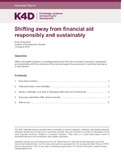| dc.contributor.author | Gioacchino, Gioel | |
| dc.coverage.spatial | Denmark | en |
| dc.coverage.spatial | Vietnam | en |
| dc.coverage.spatial | Netherlands | en |
| dc.coverage.spatial | Burkino Faso | en |
| dc.coverage.spatial | Guatemala | en |
| dc.coverage.spatial | Nicaragua | en |
| dc.coverage.spatial | Tanzania | en |
| dc.coverage.spatial | Zambia | en |
| dc.coverage.spatial | Bolivia | en |
| dc.coverage.spatial | South Africa | en |
| dc.coverage.spatial | Botswana | en |
| dc.coverage.spatial | Spain | en |
| dc.coverage.spatial | Sweden | en |
| dc.coverage.spatial | Malawi | en |
| dc.date.accessioned | 2018-12-17T15:32:54Z | |
| dc.date.available | 2018-12-17T15:32:54Z | |
| dc.date.issued | 2018-08-15 | |
| dc.identifier.citation | Gioacchino, G. (2018). Shifting away from financial aid responsibly and sustainably. K4D Helpdesk Report. Brighton, UK: Institute of Development Studies | en |
| dc.identifier.uri | https://opendocs.ids.ac.uk/opendocs/handle/20.500.12413/14185 | |
| dc.description.abstract | This report reviews global evidence on strategies or approaches that have worked in ensuring a responsible and sustainable shift from provision of financial aid support to governments to technical assistance alternatives. The narrative is raised due to many donors are rethinking aid delivery away from the provision of direct financial aid through modalities like General Budget Support (GBS). Several trends are contributing to this reassessment. The world has become more complex and more diverse in the last decade, with a wave of countries graduating from aid, and several countries once considered developing countries now becoming donors themselves. This report is not concerned with establishing whether interrupting financial aid is appropriate. Instead, based on an awareness that there is a trend towards reducing or ending financial aid, or substituting financial aid for other forms of cooperation, the report reflects on the potential risks and issues around aid exit, transition, or transformation and presents some of the lessons learned to support appropriate and responsible shifts. It begins with an elaboration on historical trends in aid modalities, then move to analysis on issues, challenges, and risk of managing shifts away from financial aid. Any decision to end foreign aid needs to be carefully thought through and planned in coordination with local partners. Decisions to fade out financial aid should consider several risk factors which could hinder the success of a transition process; from the exclusion of government actors from the transition planning and implementation to lack of coordination with other bilateral donors. In the final section, the author provides a review on ensuring sustainable shifts. To be considerate towards the sustainability of development achievements in the partner country, as well as to the health of bilateral relations, donor countries might consider the following lessons learned from previous aid transitions: Inform the transition through a broad consultation process with state and non-state stakeholders; Implement aid transformation gradually and with flexibility; Fulfil previously established commitments (the legal as well as non-legally binding ones); Invest in knowledge exchange; Include long-term exit planning in aid strategies; and Consider continued investments in sectors that might not be prioritised by the local partners but promote the public good. | en |
| dc.language.iso | en | en |
| dc.publisher | IDS | en |
| dc.relation.ispartofseries | K4D Helpdesk Report;375 | |
| dc.rights.uri | https://www.nationalarchives.gov.uk/doc/open-government-licence/version/3/ | en |
| dc.subject | Aid | en |
| dc.subject | Development Policy | en |
| dc.subject | Economic Development | en |
| dc.subject | Finance | en |
| dc.subject | Health | en |
| dc.subject | Millennium Development Goals | en |
| dc.title | Shifting Away from Financial Aid Responsibly and Sustainably | en |
| dc.type | Other | en |
| dc.rights.holder | © DFID - Crown copyright 2018. | en |
| dcterms.dateAccepted | 2018-08-15 | |
| rioxxterms.funder | Department for International Development, UK Government | en |
| rioxxterms.identifier.project | K4D | en |
| rioxxterms.version | VoR | en |
| rioxxterms.funder.project | 238a9fa4-fe4a-4380-996b-995f33607ba0 | en |

